Let’s be real, communication in relationships is touted as the bedrock of a healthy bond, but it is also among the hardest aspects to get right. You think you’re being clear, but your partner hears something completely different. You try to open up, and suddenly it turns into a fight. Sound familiar? You’re not alone. Most relationship problems aren’t about big betrayals or dramatic fights. They’re about feeling misunderstood, unheard, or emotionally disconnected. That’s why mastering the art of open communication in a relationship becomes so crucial.
Now, let’s make one thing clear. Open communication doesn’t mean constant talking or saying everything that comes to mind. It’s about creating a space where both you and your partner feel safe enough to say the hard stuff, hear each other out, and work through things as a team. And how exactly do you do that? Let’s break down what open communication in a relationship really means, why it matters so much, and how to actually get better at it, with insights from counseling psychologist Tanvi Jajoria (MA in Applied Clinical Psychology), co-founder and director of MentAmigo and an internationally certified EFT Practitioner, to help you get it right.
What Is Open Communication In A Relationship?
Table of Contents
Before we get into the nuances, let’s make sure we’re on the same page about what is open communication in a relationship. Tanvi explains, “Open communication means the people involved are able to be authentic with their feelings with each other, convey what they want to say effectively, and hold space to understand their partner even at the time of disagreements.”
Rules of communication in relationships suggest that both partners should be able to express their thoughts, feelings, needs, and concerns to each other in an honest and respectful manner. So, open and honest communication in a relationship typically boils down to the following aspects:
- There is space in the relationship for you to share your thoughts, emotions, and experiences with your partner, even if they are difficult
- You are a good listener, which means you make an effort to listen to your partner’s perspective and understand their point of view without interrupting or judging them. And vice-versa
- You can be honest with your partner, even if it’s uncomfortable or inconvenient, and you trust them to do the same
- You receive feedback in a respectful and constructive way, focusing on the issue at hand
- You refrain from attacking each other personally
- You work through conflicts and disagreements together in a calm and respectful manner
- You appreciate your partner with words of affirmation, and feel appreciated
- You focus on solutions that are for the best of the relationship instead of for the sake of winning the argument
- You both offer each other emotional support and encouragement during difficult times
- You are transparent about important issues such as finances, health, and personal values
- You make an effort to keep each other informed and involved in decisions that affect both of you
Alternatively, if you find you and your partner blaming each other, lying to each other, stonewalling or shutting each other out, assuming things, being defensive, showing passive aggression, seeing trust issues and jealousy creep in, you are most likely witnessing a lack of effective communication in your relationship.
Related Reading: Falling Out Of Love In A Long-Term Relationship – Signs And What Should You Do
So, how does honest communication improve relationships? Explaining the importance of communication in relationships, Tanvi says, “Communication plays a big role in developing any healthy relationship. In romantic relationships, particularly, people have a very different set of expectations from their significant other than what they would have from any other close friend or family member.

“However, in a lot of situations, instead of communicating these expectations and/or desires, we expect our partner to understand on their own. This unrealistic expectation creates a communication gap.” Here are some of the relationship issues that are caused by this communication gap:
- Unmet needs
- Feeling lonely in the relationship
- Not being on the same page as your partner
- What was supposed to be a beautiful partnership where you just “get” each other, begins to feel increasingly frustrating
- Feeling fear that your partner will get upset, will give an ultimatum, will put the blame on you, will remind you of your past mistakes, and will shame you
In fact, feeling the fear of ridicule, judgment, or anger is why people end up keeping secrets or hiding things from their SOs. Did you know, as per a survey of 5,000 participants, a leading cause of infidelity is a lack of communication or not feeling seen, heard, and understood by your partner? That pretty much sums up the importance of communication in relationships and what you risk losing out on if you don’t nurture in your relationship the ability to honestly express your feelings, thoughts, needs, and wants.
Open vs. Closed Communication: A Detailed Comparison
Open communication creates trust, safety, and closeness, while closed communication slowly erodes connection. When you and your partner can share openly and listen without judgment, love deepens. But if silence, blame, or avoidance become the norm, small cracks can quickly turn into distance.
| Aspect | Open Communication | Closed Communication |
| Honesty | Shares feelings, needs, and concerns openly | Hides or withholds emotions, avoids difficult topics |
| Listening Style | Actively listens, reflects, and asks clarifying questions | Interrupts, dismisses, or tunes out during conversations |
| Conflict Handling | Resolves calmly with a focus on solutions | Escalates conflicts, blames, or withdraws from discussion |
| Language Style | Uses “I” statements, respectful tone | Uses blame-shifting, accusations, sarcasm, or passive aggression |
| Emotional Climate | Safe space for vulnerability and openness | Fear of judgment, ridicule, or retaliation |
| Nonverbal Cues | Open posture, eye contact, steady tone | Closed posture, avoidance, harsh or defensive tone |
| Trust Level | Builds trust through transparency and follow-through | Creates suspicion, secrecy, or mistrust |
| Daily Interaction | Small check-ins, appreciation, affectionate gestures | Indifference, minimal interaction, emotional neglect |
| Outcome for Relationship | Strengthens intimacy, fosters long-term love and connection | Leads to emotional distance, dissatisfaction, or breakups |
How Open Communication Helps Build Lasting Love
Healthy relationships aren’t born out of luck—you build them, word by word and moment by moment. When you make space for honest, steady conversations, you’re not just exchanging words—you’re nurturing intimacy and trust that can withstand time.
- Builds emotional intimacy: Sharing your vulnerabilities lets you connect on a deeper level. Clinical psychologist Dr. Sue Johnson says, “Being able to turn to your partner and know they’ll respond is the essence of secure love.”
- Strengthens trust: Telling the truth, even when it’s hard, soothes insecurity and creates safety
- Prevents misunderstandings: Addressing small letdowns early keeps them from snowballing into resentments. For example, a survey found that communication problems are cited in 65% of divorces
- Enhances emotional alignment: Feeling seen and understood helps partners grow more in sync
- Predicts relationship success – The monumental Harvard Study of Adult Development reveals that the warmth and closeness of our relationships are the strongest predictors of long-term happiness and health
- Buffers conflict with positive interactions – Dr. John Gottman found that stable couples maintain a ratio of five positive exchanges for every negative one during conflict. This balance predicts with over 90% accuracy whether they’ll stay together
- Supports resilience in adversity – Open conversation turns tough times into “we’re in this together,” not a divide, helping you face challenges as partners, not opponents.
12 Commandments of Open Communication In A Relationship
Now that it’s clear that open and honest communication fosters trust, understanding, and intimacy between partners, there is no reason to beat around the bush. Let’s get straight to the 12 commandments of open communication in a relationship, as underlined by our expert. By implementing these guidelines, couples can enhance their communication skills and strengthen their relationship.
1. Practicing active listening
If you’re wondering how to fix communication in a relationship, you need to work on your listening abilities. Active listening is the cornerstone of open communication and one of the best ways to communicate better in a relationship. Being a good listener involves giving your full attention to your partner, allowing them to express their thoughts and feelings without interruption. This means setting aside distractions, such as smartphones or television, and focusing on the conversation at hand.

So, now you are looking into their eyes, and you have kept your laptop away. But are you listening to understand them, or are you waiting for them to finish so that you can convey your point? Explaining how to communicate effectively with your partner, Tanvi says, “Don’t listen to respond, but listen to understand with an open mind.” This is the key to an effective listening strategy in a relationship. Here’s how to practice it:
- Look at your partner instead of your phone or TV
- Listen to understand, not to prepare your reply
- Summarize what you heard. For example, “So you felt hurt when…”
- Ask clarifying questions instead of assuming
Related Reading: Expert Talks About 9 Must-Try Couples Communication Exercises
2. Creating a safe space
Being honest and open with your partner is essential to building trust in a relationship. This means sharing your feelings, thoughts, and concerns freely. But it isn’t easy to practice the policy of full disclosure just because you read it somewhere.
Couples need to make an intentional effort toward creating this space. Promises will have to be kept. Rules will have to be followed. You will have to be more forthcoming about communicating needs in a relationship. Here are some tips to help you foster emotional safety in your relationship to enable an open line of communication:
- Remove predictable, undesirable consequences of honesty. For example, if you always walk out of the room, or shut your partner out, decide not to do it the next time your partner tells you something that upsets you
- Create such rules as per the needs of your relationship
- When you tell your partner that you are going to listen carefully, follow through with that promise, no matter what
- Do not say things like “I told you so” or “Only if you had listened to me” when mistakes are made. Allow each other to make mistakes and learn from them
- If you need space to process information, convey to your partner that you need space and assure them that you will be back once you are feeling better
3. Using “I” statements
“’You made me feel bad’ vs ‘I felt bad in that situation’ – Which one do you think you would respond to in a better way if your partner said it to you?” asks Tanvi, and then adds, “Focus on ‘your’ feelings, ‘your’ thoughts, and ‘your’ experiences. More blame only leads to more defensiveness and less understanding.”

Using “I” statements is one of the simplest yet powerful tips on how to communicate effectively with your partner. It allows you to express your feelings without accusing your partner of malice or inadequacy. The moment you say, “You never listen to me,” you put the blame on your partner. If they respond with a “No, I always listen to you,” or engage in some blame-shifting themselves, you have no way to prove otherwise, and the conversation goes nowhere. Here is how to rephrase your conversations to keep them constructive and reduce defensiveness.
- Say: “I felt hurt when…” instead of “You always hurt me.”
- Focus on your feelings and needs, not your partner’s faults
- Stay specific rather than making general accusations
- Communicate from your perspective, not assumptions
Related Reading: 33 Phrases To Shut Down Gaslighting And Silence Gaslighters
4. Choosing the right space and time for a conversation
How to communicate effectively with your partner, you ask? Time it well. You can’t just say anything to your partner anytime, anywhere. In fact, being mindful of time and space can convey to your partner that you value and respect them. This stimulates vulnerability and opening up. Pay attention to the following, especially when you need to bring up something intense or difficult:
- Talk when you have calmed down
- Ask your partner when they are willing to talk. Wait if needed.
- Set clear intentions so no one is taken aback and so you don’t digress
- Minimize distractions while talking by choosing a quieter time and a private space
- Be open to rescheduling if something comes up
5. Paying attention to nonverbal communication
To understand how to fix communication in a relationship, you need to look beyond words. Nonverbal communication, such as body language, facial expressions, and tone of voice, plays a significant role in conveying messages and emotions. So, yes, as the cliche goes, it truly doesn’t matter what you say, but how you say it.
Tanvi advises, “Observe your partner’s reactions, notice the various facets of their communication style. There’s a lot we miss when we don’t pay attention to our partner beyond their words.” Similarly, along with your partner’s nonverbal cues, you should also focus on your own. Other ways to communicate better in a relationship nonverbally are:
- Maintain eye contact
- Adopt a relaxed and open posture
- Your voice can show a range of emotions such as aggression, confusion, or anxiety. Pay attention to loudness, control, steadiness, etc
- Use a calm tone of voice to create an open and inviting atmosphere for conversation
- Pay attention to your pace of speaking. Speak clearly
- Keep your volume stable and pleasant
Related Reading: Should You Share Everything With Your Partner? 8 Things You Shouldn’t!
6. Asking open-ended questions
Asking open-ended questions has forever been advocated as the best tool to foster an open line of communication in all sorts of interpersonal relationships, be it the workplace, classroom, or your therapist’s office. Your relationship with your partner is no different. Tanvi encourages you to take this strategy into your home and ask your partner in clear words to share their thoughts and feelings. Open-ended questions with your partner will do the following:
- Help clarify doubts
- Encourage them to share more, especially if you are feeling disconnected from your partner
- Show that you’re interested in what your partner says
- Draw them into a conversation
- Sustain the conversation

These questions typically begin with “how,” “what,” or “why” and allow for more in-depth answers than closed-ended questions or yes-no type questions. For example:
- Closed-ended: Are you upset? I don’t know why you get upset so easily!
- Open-ended: Tell me, what’s bothering you?
When Emma noticed that her partner, Alex, seemed upset, she asked, “Tell me. What’s bothering you?” This open-ended question encouraged Alex to share their concerns about work, allowing them to have a meaningful and supportive conversation.
7. Practicing empathy
Empathy is the ability to understand and share another person’s feelings. By putting yourself in your partner’s shoes, you can better comprehend their perspective and respond with compassion.
We may feel like we know a lot about our partner, but at times we don’t. In order to understand someone, we need to learn to look at their experiences from their perspective. If you can share something with your partner without the fear of being judged or your problems being minimized, that means you feel safe with them.
—Tanvi Jajoria, counseling psychologist
Developing empathy not only strengthens relationships but also improves cooperation and makes forgiving each other easier. All these lead to a more seamless communication flow between couples. Here is how you can cultivate it:
- Imagine how you would feel in their situation
- Validate feelings: “I can see why that upset you.”
- Avoid minimizing their concerns
- Use words, tone, or touch to show compassion
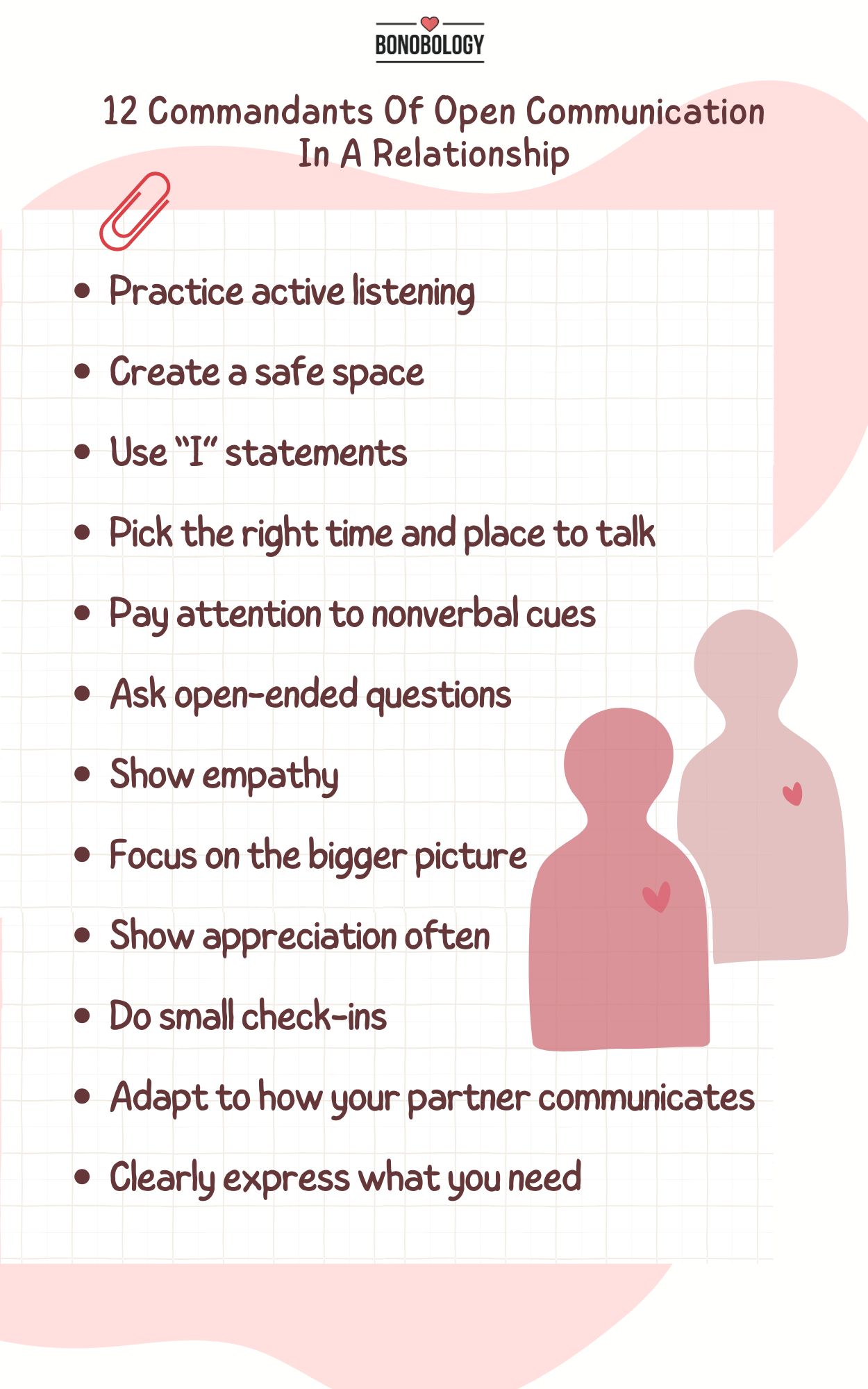
8. Focusing on the bigger picture
Disagreements are inevitable in any relationship, but how couples manage conflict can significantly impact their overall satisfaction. Adopting a constructive approach to conflict resolution, such as focusing on finding solutions rather than assigning blame, can promote healthier communication. What all this simply means is that you must prioritize what’s important, especially in the face of friction. This can help you:
- Let things go
- Avoid getting into petty arguments and insignificant details, and getting sidetracked
- Focus on shared values and goals for the relationship
- Allow forgiveness and move on from a space of anger
- Be flexible and more accommodating during a difficult conversation
- Stay positive and optimistic about the future of the relationship
9. Show appreciation and positivity
The importance of communication in relationships isn’t limited to solving problems. It also plays a crucial role in helping two partners build each other up. Make it a habit to express what you appreciate.
Tell them what you love and appreciate about them and thank them for the little things they do daily.
—Tanvi Jajoria
A simple “Thank you for making dinner” or “I appreciate how you always listen” brightens your partner’s day and encourages more openness. Use kind words and compliments often. Some other ways of showing appreciation toward your partner include:
- Express gratitude for daily actions
- Offer compliments regularly
- Highlight strengths more than flaws
- Balance criticism with positive remarks
Related Reading: 150 Words Of Affirmation Examples To Cement Your Bond
10. Keep an open line of communication with small check-ins
Even everyday communication strengthens your bond. You don’t need to wait for big relationship problems to talk to each other. Instead, make it a habit to,
- Send short texts during the day
- Share small updates about your day
- Leave notes or messages showing thoughtfulness
- Ask simple check-ins like “How was your day?”
These little gestures show care. Tanvi says, “Letting your partner know that they’re on your mind, texting them throughout the day, or even leaving a note keeps an open line of communication in the relationship and improves your connection over time.” These small but thoughtful check-ins help build trust and warmth between partners.

11. Adapt to your partner’s communication style
We all have different ways of expressing ourselves. As Tony Robbins notes, “Effective communication with your partner will come from acknowledging that people communicate differently.” To foster open communication in a relationship, you need to learn how your partner “receives” love and information. So,
- Notice if they prefer talking in person, over text, or through calls
- Respect their love language, be it words of affirmation, acts of service, physical touch, gifts, or quality time
- Adjust your approach depending on whether they are more visual, verbal, or physical in processing
- Avoid pushing your style as the only correct one
12. Clearly communicate your needs and expectations
Don’t make your partner guess what you want. Instead, start communicating needs in a relationship plainly and kindly. For instance, if you’re feeling overwhelmed, say, “I’m really stressed by work this week and I could use some extra support”, rather than brooding or dropping hints. By explicitly discussing chores, schedules, or feelings, you avoid confusion. Remember, communicating needs in a relationship isn’t nagging, it’s healthy teamwork. If you leave needs unsaid, small relationship resentments can keep festering until they are hard to handle.
Bonus: 5 Daily Habits for Open Communication
Lasting love isn’t built on grand gestures alone. It thrives and is nurtured through small, everyday choices that keep your bond strong. Simple habits, practiced consistently, can make your partner feel valued and keep the lines of communication open. If you want to build a bridge of open communication in your relationship, here are five habits you must inculcate:
- Listen without distraction: Give your full attention for at least five minutes every day. No phones, no multitasking, just listening.
- Make “I” statements your default mode: Use one “I” statement to share how you feel instead of placing blame
- Check in once daily: Be it through a short question, text, or call, show your partner that you’re thinking of them
- Show appreciation: Acknowledge one small thing they did and express genuine appreciation
- End the day on a positive note: End each day on a kind, positive note rather than leaving conflict unresolved
FAQs
Open and honest communication is one of the most essential tenets of happiness in a relationship. Open communication allows partners to be on the same page and reduces trust issues and misunderstandings. If you lack good communication, you might say things to your partner that you will regret later.
2. What are some examples of open communication?
Rules of open communication in relationships tell us that the conversation should happen at an appropriate time and place. Blame-game is wrong, and “I” statements must be used. It’s important that you be a good listener, ask open-ended questions, and create a safe space in the relationship devoid of judgment, ridicule, etc.
Yes, open communication is one of the strongest predictors of lasting attraction and intimacy. When you’re honest about your needs and feelings, it builds trust and emotional closeness. This, in turn, builds a healthy relationship. Research from the Harvard Study of Adult Development shows that the quality of your conversations and connections directly affects long-term relationship satisfaction. Without open dialogue, misunderstandings pile up, attraction weakens, and emotional distance grows over time
The signs often show up in everyday interactions. If small disagreements always spiral into arguments, or if you feel you’re “talking but not being heard,” communication is breaking down. Defensiveness, frequent misunderstandings, and shutting each other out, also known as stonewalling, are classic red flags. Passive-aggressive remarks, avoiding important topics, and a lack of emotional safety, where one or both partners feel they can’t be vulnerable, are also strong indicators. Over time, these patterns create distance and resentment.
Start by creating safety rather than pushing them to talk. Use empathy to acknowledge that some topics may feel overwhelming. Try framing concerns with “I” statements, such as, “I feel anxious when we don’t discuss finances,” rather than blame. Ask gentle, open-ended questions like, “What would make it easier for you to talk about this?” If avoidance becomes a recurring pattern, consider couples counseling. A therapist can guide both of you toward healthier ways of opening up without fear or defensiveness.
Key Pointers
- One can avoid misunderstanding in a relationship by keeping effective and constant communication as their top priority
- Good communicators are good listeners. They hear as much, if not less, as they speak
- They make sure they choose the right space and time to “talk”, avoid blame, and use “I” sentences. They ask open-ended questions to facilitate conversation and pay attention to nonverbal cues
- It is essential to create a safe space for communication in a relationship
- Being more empathetic and focusing on what’s important during conflicts can help you forgive easily, let go, move on, and not get bogged down by unnecessary details
Final Thoughts
By following these eight rules of open communication, couples can enhance their communication skills and foster a stronger, more resilient relationship. Tanvi doesn’t forget to remind us, “Approach communication as a joint effort to resolve an issue that you and your partner are together against. The ‘problem’ is the problem, not you, nor your partner.”
These are fairly doable commandments for effective communication in a romantic relationship. But if you feel overwhelmed when putting them in action, if something about your relationship feels off, and you feel that you and your partner are not able to cross this hurdle, you should consider seeking help from trained professionals. Should you need that, Bonobology’s panel of expert counselors is here to help you.
Tips To Practice Emotional Attunement To Transform Your Relationships
Effort In A Relationship: What It Means And 12 Ways To Show It
How To Keep A Relationship Exciting And Interesting For Long Term
Your contribution does not constitute a charitable donation. It will allow Bonobology to continue bringing you new and up-to-date information in our pursuit of helping anyone in the world to learn how to do anything.

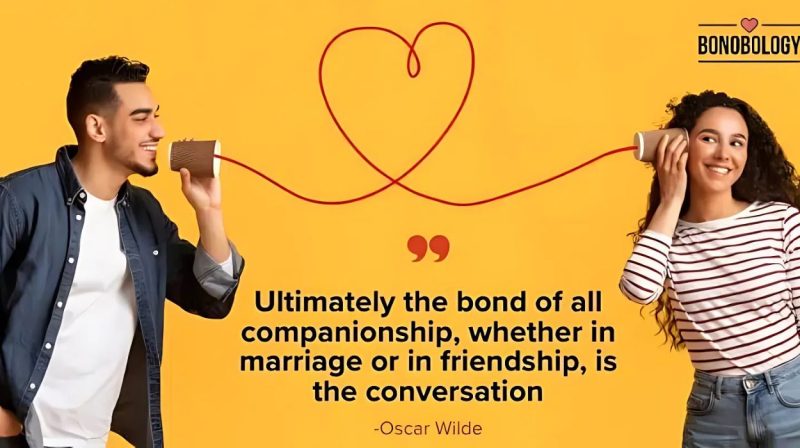


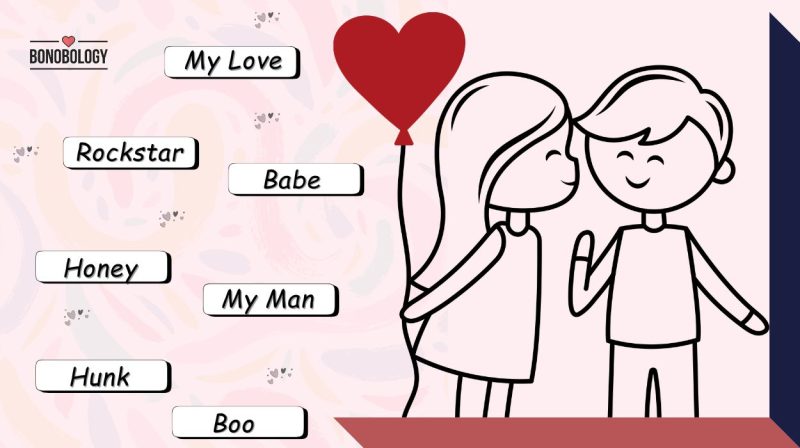

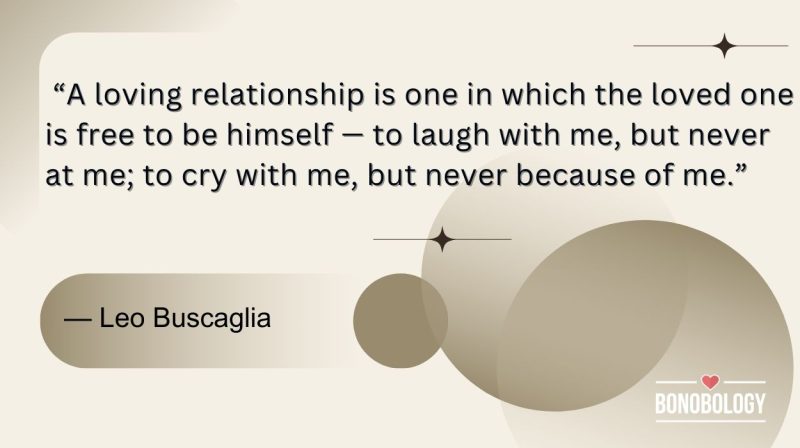

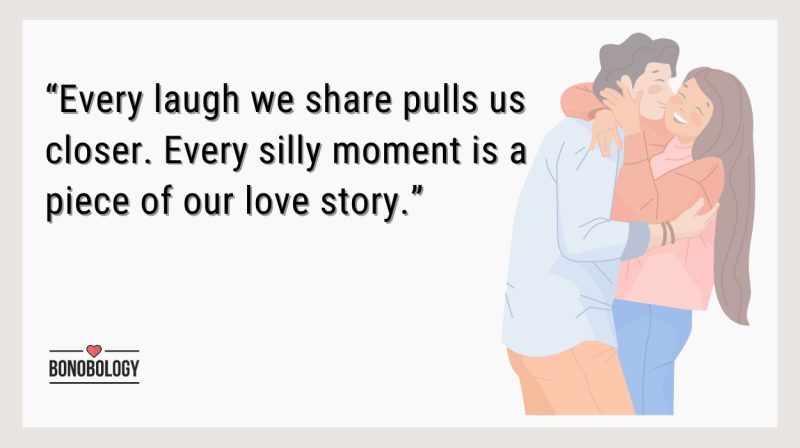
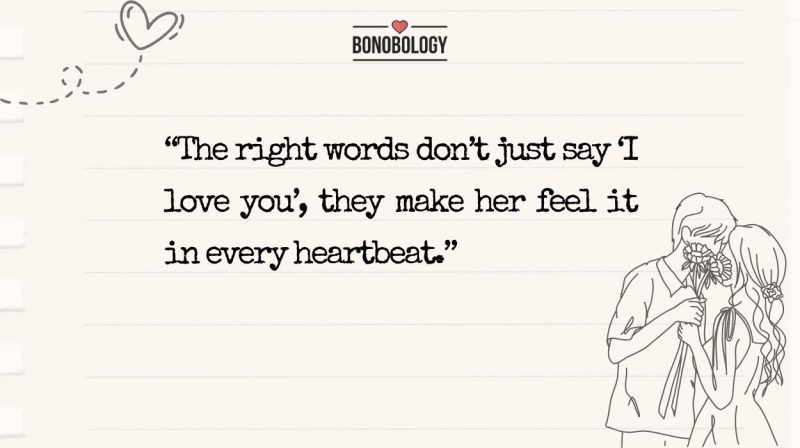












Featured
Love Songs For Him: The Ultimate Guide To Expressing Your Heart
What Do Guys Like To Be Called By Their Partners? These 20 Names
25 Signs A Guy Is Attracted To You, According To Dating Experts
What Is A Real Relationship? 13 Defining Characteristics
130 Beautiful Things to Say About Your Wife
101 Silly Questions To Ask Your Partner For Fun, Laughter, And Bonding
200 Heart Touching Love Messages For Her
50 вопросов с подвохом, которые стоит задать своему парню
250 випадкових запитань, які можна задати своєму хлопцеві
Kız Arkadaşınızın Bayılacağı 170 Şirin İsim
21 sinais de que ele gosta de fazer amor com você
101 Όμορφα κομπλιμέντα για γυναίκες για να λιώσουν τις καρδιές τους
140+ χαριτωμένα ψευδώνυμα για να καλέσετε τον φίλο σας
35 cartas de amor para él que lo harán llorar
35 lettres d’amour pour lui qui le feront pleurer
Uzmanlar Tarafından Desteklenen Erkek Vücut Dili Çekiciliğinin 20 İşareti
25 lettres d’amour profondément émouvantes pour elle qui la feront pleurer
35 lettere d’amore per lui che lo faranno piangere
10 Mutlaka İzlenmesi Gereken Genç Erkek Yaşlı Kadın İlişki Filmleri
25 lettere d’amore profondamente emozionanti per lei che la faranno piangere